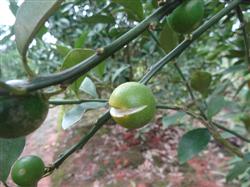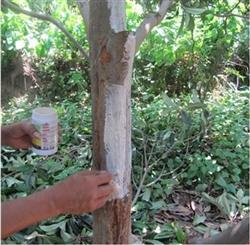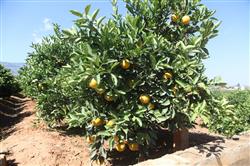What about the cracked citrus fruit?

What about the cracked citrus fruit? Please introduce that citrus fruits are easy to crack from July to September before harvest. The main reason is that the fruit develops and expands, gradually enters the mature stage, the pericarp stops growing or thickening, while the juice cell in the fruit elongates and expands rapidly, which presses the exocarp to become thinner rapidly. If the mature period continues with severe drought and water shortage followed by heavy rain or continuous sufficient rain, the juice sac absorbs too much water, the orange peel grows too fast, and the pericarp can not withstand great pressure, fruit cracking will occur. In addition, fruit cracking is also related to cultivation techniques. If the ventilation and light permeability in the orange orchard is poor, the groundwater level is too high, the soil waterlogging is serious, the application of nitrogen fertilizer is too much, and the fruit is set too much, the pericarp will become fragile and fruit cracking will often occur. Fruit cracking is also related to varieties, navel orange is easy to crack fruit, late ripening Wenzhou mandarin, Dahong sweet orange or mandarin orange is more resistant or less resistant to fruit cracking. To prevent citrus fruit cracking, we should mainly take the following measures: keep the soil moist. In the high temperature period, pine tree plate soil can be thinned, then water and fertilizer can be applied, and then the tree plate can be covered with weeds, green manure or other weeds, which is helpful to preserve soil and water and reduce nutrient loss. From July to September, if the drought lasts for more than 7-10 days, the fruit should be irrigated immediately to maintain moisture and prevent cracking. The amount of irrigation should be about one ton per mu of orange orchard, and the effect of sprinkler irrigation is the best, followed by irrigation and furrow irrigation. Regulate tree nutrition. The fruit cracking can be reduced by applying less phosphate fertilizer and increasing potassium fertilizer, nitrogen fertilizer and farm fertilizer. From July to early August, Bian dug holes 30-40 cm deep on both sides of the fruit tree crown and applied 30 kg of human feces and urine, 0.2 kg of urea, 0.2 kg of potassium oxide, and 3-5 kg of plant ash instead of potash. 0.3% potassium sulfate or potassium dihydrogen phosphate was sprayed on the leaves after 4 pm every day, once a week. Chemical control of fruit cracking. When the mixture of naphthylacetic acid (30/1000000) and kinetin (10/1000000) was sprayed during fruit expansion, the occurrence of fruit cracking could be reduced. In the dry period, 0.3% urea solution or gibberellin with a concentration of 30/1000000 was sprayed on the part of the tree crown bearing fruit in the evening, once a week, even three times; it can also be coated with gibberellin with a concentration of 20/1000000 in drought and no rain, which has a better anti-cracking effect. Or one month before citrus harvest, foliar spraying 0.3% potassium sulfate and 1% calcium oxide solution has a significant effect on reducing fruit cracking, while increasing fruit sweetness and reducing acidity. Extra-root topdressing. During the fruit expansion period, 0.5% urea or 0.3% potassium dihydrogen phosphate or 0.1% Fenwei aqueous solution was sprayed to stimulate pericarp growth, keep the peel and pulp growth consistent, and prevent fruit cracking at high temperature. When spraying, the middle and lower parts of the orange tree should be sprayed again, once in 7-10 days, 3-5 times in a row. Or use urea 150 grams, potassium nitride 100 grams, vinegar 100 grams, lime 100 grams, spray 50 kilograms of water, also have anti-cracking effect. Click to get more citrus planting techniques click to get more fruit planting techniques
- Prev

How to manage loquat after picking fruit?
How to manage loquat after picking fruit? After picking loquat, please refer to the following methods for management: ploughing and loosening the soil. When picking loquat, due to man-made trampling, the orchard soil is hardened, which is not conducive to root growth, and it is easy to breed weeds and compete for fertilizer and water with loquat in plum rain season. Therefore, ploughing and loosening the soil in time after fruit picking.
- Next

How to manage oranges in summer and autumn?
How to manage oranges in summer and autumn? Please introduce that summer and autumn is the peak period of citrus diseases and insect pests, which is in the period of fruit expansion, which requires a lot of fertilizer and water, and is also in the dry season with high temperature and extreme heat and little rain. Therefore, attention should be paid to strengthening the management of citrus orchards in summer and autumn. The specific measures are as follows:.
Related
- Moge, come on! The staff of the peasant association in the producing area of cantaloupe were frightened when the crowd gathered.
- Causes and Solutions of low Fruit setting rate of Apple
- Symptoms and control measures of passion fruit virus disease
- Fruit growing lesson: how do apple orchards keep high yields?
- Can you build orchards in the mountains? What are the pros and cons?
- How to manage the coloring period of Crisson grape?
- This paper introduces the processing technology of two kinds of fig products.
- How much is a month for retired teachers in rural areas by 2020?
- How can strawberry planting increase sugar content? We should pay attention to management in many aspects.
- What are the cultivation techniques on how to improve the yield of golden fruit?

